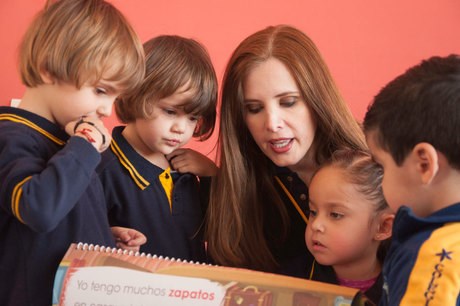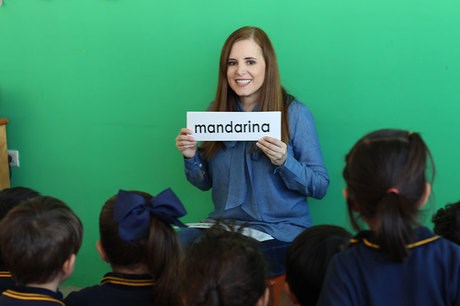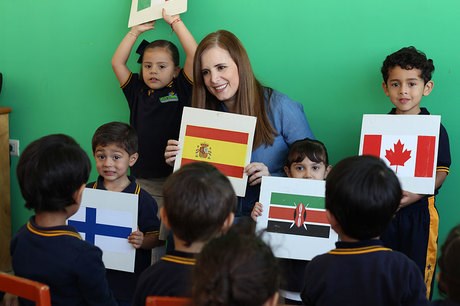Interview - Elisa Guerra
Elisa Guerra
Monday, February 6, 2017
Founder of Colegio Valle de Filadelfia in Metepec, Mexico

Why did you set up your own school?
When I became a mother, I was in awe of my son’s passion for learning. I wished for him to be able to enjoy reading, music and art, among many other things. So I became his first teacher, when he was very young.
By the time he was old enough to enter kindergarten, I was not happy with the options available in my city. I tried three of them, all in the private sector, but found their programmes to be traditional and dull. My son became bored and unmotivated. I have to say he was not the kind of student that would thrive in typical schools: he was full of energy, had boundless curiosity and usually questioned everything and everyone.
I tried homeschooling for a while, but still longed for more. So I decided I had to found the school I wanted for my children. I opened a little pre-school when Leo was five. Annie, his little sister, was just two. Five years later, in 2004, that project evolved into Colegio Valle de Filadelfia.
It was not easy. I had no formal training as a teacher, so I was learning alongside the children. And money was tight. I sold my car so I could afford to open the school. Later on I got my teaching degree by studying at home for the national examinations.
You have earned international acclaim, as the 2015 Best Educator in Latin America and as a finalist in the Global Teacher Prize Top 50 for 2015/16. Can you tell us about why your teaching methods are so successful?
As a mother, I read several books on parenting and education, and attended the courses presented by The Institutes for the Achievement of Human Potential in the US (Philadelphia). I learned that it was possible for tiny children to easily and joyously learn to read, and also maths, music and foreign languages. The techniques felt so natural. Very soon I began to see results at home.
But teaching your own child in your living room is a world of a difference from teaching a group of kids in a school setting. I needed to make adaptations. So I did. Little by little, as I learned more, I refined the programmes, created a rich curriculum and integrated some elements from other interesting proposals, like Reggio Emilia and Harvard’s Project Zero. I also developed some programmes of my own, like early global citizenship and cultural awareness.
The teaching materials were also a problem. There were none, commercially made, to suit our needs. So again, I created my own.
At the beginning, we just printed the books ourselves with a Xerox machine. But eventually, Pearson Education embraced my books and now there is a published series for Early Learning: a total of 12 learning books for children and their teachers.
I believe that our methods are successful because, even though they are ambitious, they are also respectful of the child as whole and take their interests into account. Also, they are designed around the way the brain learns and develops, so it feels natural for the kids.
Children learn algebra at five and the violin at three at the Colegio Valle de Filadelfia. What is the early years curriculum like at your school?

Elisa Guerra with children from the Colegio Valle de Filadelfia
It’s like a whirlwind of excitement! We strive to provide our children with ample opportunities for development and an enhanced environment of stimulation. Opportunity and stimulation are the key words here.
We see learning as a privilege, as a great gift for the child. Which is very different from the more traditional view of learning as a child’s ‘job’, or even as an obligation.
So learning opportunities are presented to our kids with no pressure. We just provide the environment and allow for nature (and little kids’ amazing brain power) to do the rest.
Parents typically enrol their kids to school at age three, but we do get some two-year-olds and, in some cases, even younger.
All our early learners are immersed in a bilingual environment. They learn English and Spanish almost at the same time and rate. We also have a third language (French in our case) but English and Spanish get most of the school time.
We listen to a different classical composer every month, and get to know the paintings of our featured artist. And of course, we love to explore different countries, so we do that too – their music, landmarks, people, traditions, geography, animals and lots of interesting facts.
Children enjoy physical movement every day. That includes crawling, creeping, brachiating (using an overhead ladder, or monkey bars) and many vestibular activities like rolling and swinging. Our four- and five-year-olds do initial gymnastics. They also have many hands-on activities and times for free play.
Early reading and maths, as well as writing and violin are core parts of our programme.
Teaching sessions are very brief – from seconds to minutes- and very frequent, distributed over the course of the morning. Intensity of the sessions is crucial. They are loaded with enthusiasm and energy. The materials are big and bold. The teacher’s voice needs to be expressive and joyful.
Because learning is a gift, we do not expect anything back from the children. Testing is a no-no. Instead, we like to provide our kids with opportunities to use their skills and knowledge to solve problems – if they wish to do so.

You acknowledge in the documentary that your methods are controversial. What do you say to your critics?
Yes, there is still some controversy – especially in how soon is too soon to teach reading or algebra or many other things.
Some people argue that tiny children do not ‘need’ to learn that much and that teaching them so early can even harm them somehow. I am convinced this is a misunderstanding.
Some time ago we began to realise how powerful the brain is and how babies and little kids are wired for learning. Scientific publications were followed by a commercial frenzy that planted a sense of urgency in parents’ hearts worldwide.
At the same time, the disappointing results of school education, the poor or mediocre academic performance of our children, the outcry for accountability and the race for higher international test scores exploded.
In search of solutions for an inefficient education model, and coinciding with the new findings about the brain, we found a false door. In an unfortunate rationale, the world tried to fix the problem by starting ‘formal’ education earlier. If the brain was so capable, why not?
But this is what happened. ‘Elementary school’ was forced onto three- and four-year-olds.
Why would they think that something bad would magically become good just by fast-forwarding our kids to it? Everything that older kids loathed – the pressure, the testing, the endless repetition of dull exercises – was hated by the younger ones too. We kept failing.
Then something just as crazy happened. Many educators, trying to gain our kids back – and to restore them with the much loved activities that many times were lost – like the arts, PE and even recess – pushed for a ‘stress – free’ childhood: a sacred zone where kids were allowed to play and grow ‘naturally’.
Unfortunately, the world turned completely to the other side, assuming that all teaching was an imposition. Some early childhood classrooms limited of even completely banned ‘active teaching’, fearing the obscure times when children where robbed of their right to play.
That is the central gist of the disagreement. If you somehow believe that learning so much so soon is a burden to a child, then of course you will disagree with what we do at Colegio Valle de Filadelfia.
But it doesn’t have to be that way. Teaching and learning are natural and happy processes.
At our schools, we don’t bring elementary classrooms to kindergarten playgrounds. Yes, we do teach reading and algebra and many other things that most would only consider for older children. But we do it very differently from how it is usually done in traditional schools. And play keeps its leading role. We do not murder the child to make room for the scholar.
Tell us about your work with the Prospera programme, the government organisation that gives money to the poorest families in Mexico as long as they guarantee that their children go to school and have regular health check-ups.
I am very excited about the project with Prospera. It is still in its early phases, but I have much faith about what we can accomplish with the families and children.
Prospera gives regular ‘scholarship’ payments to families that meet the criteria. Once the eligibility (in terms of need) is well established, the beneficiary families must comply with the requirements of education and health. Attendance to school is closely monitored, as well as regular visits to health care centres.
Prospera serves seven million of México’s poorest. These families may have very low levels of education – or even no education at all.
The environment in which little children grow is, in many ways, deprived. So when they finally get to school at age six, there is already a huge achievement gap between them and kids that do not receive economic aid.
Propsera realised that the only way to solve this problem was to get to the children long before they enter school – and here is were our project takes place.
We are starting with early development programmes for two-year-olds, training mothers or grandmothers or whoever has the care of the children in the family.
Right now we are focusing in early reading and language, but eventually we will incorporate other programmes, such as motor development. In this project, I am working alongside not only Prospera but also with The Institutes for the Achievement of Human Potential.

You’ve just opened schools in Costa Rica and Brazil. Do you have plans to open more schools, and what are your hopes for the future?
Our schools in Brazil and Costa Rica – and in fact all the other schools in México, aside from our main campus in Aguascalientes - are not technically ‘mine’. The schools operate as franchises.
Many years ago I was approached by a mother who had enrolled her son in my first school. She later had to leave because the family moved to another city – but she had fallen in love with the project.
So she made a proposal to me to open a branch of my school in her city. I did not have the resources or the time to do so, but she was insistent. So we came up with an alternative: a franchise model.
That way, I am involved in the set up, teacher training, curriculum development, programmes, manuals, and counselling of every new school, but I don’t ‘own’ each one of them. There are currently nine ‘Colegio Valle de Filadelfia’.
I would love for our school model to continue to be replicated across countries – and languages! And to keep enriching it with new ideas.
And I also still want to find ways to reach disadvantaged kids in communities around the world, especially in developing countries like México.
Developing brains in developing countries. What better way to change the world?
The Colegio Valle de Filadelfia is featured in the Al Jazeera documentary Mexico: The Power of Early Education - part of a new six-part documentary series, Rebel Education - and is available to watch online here




